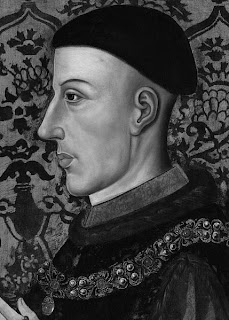MM looks at the Lancastrian Henrys, IV, V, and VI.
From The Mad Monarchist 25 April 2013)
The Lancastrians
King Henry IV: The House of Lancaster came to power with Henry IV, shortly before the deposed Richard II was starved to death. He spent most of his reign putting down rebellions but does have the distinction of being the only English king to entertain a visiting Byzantine Emperor. Like Shakespeare, I cannot help but view his many misfortunes as divine punishment for usurping the throne of Richard II. Still, Henry IV was an accomplished soldier and he always managed to prove equal to the tasks that confronted him. He really was a decisive, brave and talented monarch, attentive to religion and the Church and he defeated all of his enemies as they appeared but he seemed perpetually unlucky, plagued by constant civil unrest and terribly poor health, leading to his demise at a relatively young age.
King Henry V: With the second Lancastrian monarch, we have again another top contender for the list of greatest English kings of all time. To say he displayed heroic courage doesn’t begin to describe it. As a very young man he fought his first battle, carrying on until victory was won despite having been shot in the face with an arrow. He proved a capable administrator, he appreciated the necessity of a strong economy as a matter of national security and he was a very devoted son of the Church, dispatching heretics with the same zeal as he showed dispatching Frenchmen. And, that, of course, is what he is most famous for, renewing the Hundred Years War and invading France. As a battlefield commander, Henry V was second to none and his string of victories were hard fought, spectacular achievements. It is impossible for me to think of Henry V without the stirring words of Shakespeare ringing in my head. Most astounding was his great victory at Agincourt where, despite having every disadvantage, his longbows decimated the charging French knights, dealing a blow to the French nobility that was truly devastating. I fail to see how anyone with an ounce of English blood in their veins cannot experience a surge of pride when thinking about King Henry V on the field of Agincourt. He conquered Normandy, making a victorious peace and forcing the French king to recognize him as his heir. His reign was an unbroken string of masterful successes gallantly won.
King Henry VI: Another monarch with an impossibly tough act to follow, Henry VI is not often thought well of but I have a bit of a soft spot for the poor man. Only nine months old when he inherited the crown, he remains the youngest monarch to ever sit on the throne of England. During his reign most of the gains of his father were taken back, in large part due to a certain French girl from Domremy. Even when he was older his reign was not successful with reverses in France and the outbreak of the Wars of the Roses at home, but I cannot have a very negative opinion of King Henry VI. He simply lacked the personality to meet the crisis at hand, being the shy and compassionate sort. But he should not be criticized too much for these qualities. He founded Eton and King’s College but was not up to the task of dealing with disasters abroad and a continuously feuding court. The disasters were not his fault, he simply inherited them. He was also a very good man, very religious, devoutly so, generous to those around him and it says something that he has been accused of being both saintly and insane.

No comments:
Post a Comment
Comments are subject to deletion if they are not germane. I have no problem with a bit of colourful language, but blasphemy or depraved profanity will not be allowed. Attacks on the Catholic Faith will not be tolerated. Comments will be deleted that are republican (Yanks! Note the lower case 'r'!), attacks on the legitimacy of Pope Leo XIV as the Vicar of Christ, the legitimacy of the House of Windsor or of the claims of the Elder Line of the House of France, or attacks on the legitimacy of any of the currently ruling Houses of Europe.